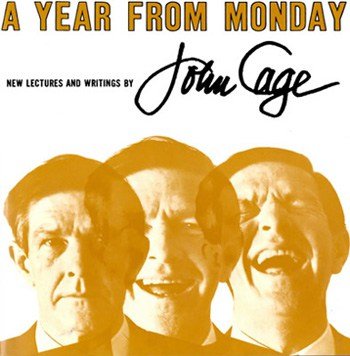ABOUT MUSIC AND MUSHROOMS
The North American composer, John Milton Cage, wasn't only a great name of twentieth century avant-garde art, he was also a mycologist, a fan of mushroom gourmet and loved hunting fungi at the woods. Author of the 4'33'' musical masterpiece, his knowledge about a great number of mushrooms species was legendary and full of stories that was related with his work as a musician and his ideas about contemporaneous art.
For instance, in Italy, during the last century, Cage was most known for his mushroom expertise rather than his experimental music. In 1959, he participated in a quiz show called 'Lascio o Rodopia' (something like 'Double or Nothing'). In this show he did an incredible performance and won a 5 million lires prize which gave him some popularity among the Italians for his TV appearance (but not for his music). The questions were related with specific themes about fungi that required a great knowledge about it. John Cage fascinated the people with his good sense of humor and his odd music.
Beyond his passion about mushrooms and music, Cage wrote a lot of mushroom related books, in a sort of diary arrangement, where he gathered all his essays, ideas, experiences, forays, trips, dinner parties and workshops he used to give in universities.

In one of these books, 'A Year from Monday', Cage begins his approach about the relationship of music and mushrooms:
Music and mushrooms: two words next to another in many dictionaries […] Once the season changes from summer to fall, given sufficient rain, or just the mysterious dampness that’s in the earth, mushrooms grow there, carrying on, I am sure, his business of working with sounds. That we have no ears to hear the music the spores shot off from basidia make obliges us to busy ourselves microphonically. (p.34)
John Cage was one of the founders of the New York Mycological Society and his mushroom collection is now carried on the McHenry Library in the Santa Cruz University in California. He was a great friend of an eminent mycologist, Alexander Smith, president of the Mycological Society for America (1945-50) and editor of the journal Mycologia (1950). One day Cage said to Smith that the thing he likes the most in botany was a feeling free from envy and jealous that he couldn't find on arts. Alexander Smith answered saying that Cage didn’t know anything about botany. In another conversation between them, Cage understood what his friend intended to say. He asked Smith about another mycologist and he got nervous asking Cage to not mention that name in his home again. Cage had a close relationship with Alexander Smith and in his books he mentions a lot of hunting days with his friend.
While hunting morels with Alexander Smith in the woods near Ann Arbor, I mentioned having found Lactarius deliciosus in the woods in northern Vermont. He said, “Were the stipes viscid?” I said, “Yes, they were.” He said, It´s not deliciosus; it´s thyinos.” He went on to say that people go through their entire lives thinking that things are that when they are actually this, and that these mistakes are necessarily made with the very things with which they are the most familiar. (p.34)
What really used to drive Cage about mushrooms was the cooking. He loved eating fungi and his knowledge was associated with aspects of fungi edibility. John Cage was an adept of macrobiotic diet, which is based on the principles of natural cycles, respecting the seasons to achieve an ecological connection between nature and humans. The macrobiotic diet was presented to him by Yoko Ono when they worked together in the Fluxus group at the early 50's.
When people recognized that Cage knew about mushrooms, they used to ask him about the trips and visions mushrooms could give. He always answered saying it wasn’t what he was looking for on mushrooms.
Life is changing. One of the ways I’m trying to change mine is to get rid of my desires so that I won’t be deaf and blind to the world around me. When I mention my interest in mushrooms, most people immediately as whether I've had any visions. […] The visions I hear about don’t interest me. Dick Higgins said he ate a little muscaria and it made him see some rabbits. Valentina Wasson ate the divine mushrooms in Mexico and imagined she was in eighteenth century Versailles hearing some Mozart. Without any dope […] I’ll be in San Francisco tomorrow hearing some of my own music and on Sunday, God willing, I’ll awake in Hawaii with papayas and pineapples for breakfast. There’ll be sweet-smelling flowers, brightly colored birds, people swimming in the surf, and (I’ll bet you a nickel) a rainbow at some point during the day in the sky. (p.140)
JC also enjoyed writing poems. And the haikus were what he liked the most. The haikus are 4 stanzas poem, most known in Japan, which referees to different seasons of the year. Cage dived into the haikus after reading Bashô. The light and simple humor was what he enjoyed about them and he used to combine the haikus with mesostics, creating wordplays. And of course mushrooms were present in these poems.

References:
Post about John Cage's presentation on the quiz-show 'Lascio o Rodopia'. http://johncagetrust.blogspot.com/2011/04/lascia-o-raddoppia-milan-1959.html
A Year from Monday, 1969. Wesleyan University Press, Middletown. John Cage.
De segunda a um ano. Trad. Augusto de Campos, 1985. Editora Hucitec.
http://en.wikipedia.org/wiki/John_Cage
The Guardian article. 'Play that fungi music'. http://arts.guardian.co.uk/fridayreview/story/0,,1271606,00.html
More about John Cage:
http://johncage.org/